Kerry Howard Mwesigwa
In the high-profile trial of Uganda v Kasolo Copriyamu & others at the High Court in Kampala, shocking testimonies of alleged torture and coercion have recently come to light. Accused Lubega Johnson and Kasolo appeared in court as witnesses for each other, providing accounts of the experiences they witnessed the other endure. The case stems from the kidnap, robbery and murder of Nagirinya Maria and Kitayimbwa Ronald for which the accused each face two counts of.
Lubega Johnson, a former plastic vendor from Kikubo, and Kasolo, testified about the events they observed while in detention. Both witnesses described being blindfolded and taken to an undisclosed location, where they encountered security officers dressed in black. The room they were brought to contained various tools, such as pliers, knives, hammers, and electric cables.
According to their testimonies, Lubega and Kasolo claimed that the officers coerced the other into signing statements without knowledge of their contents. They recounted instances of physical harm, including beatings, threats with a pistol, and stabbings with a bayonet, which persisted until compliance was achieved.
In addition to the reported torture, Lubega and Kasolo testified about the forced scene reconstructions they witnessed. They stated that the other was instructed to falsely confess to crimes while being taken to different locations, including Natete, Kosovo, Namanve, and Katwe police station. Failure to comply allegedly resulted in further beatings and intimidation.
It should be noted Section 11 of the Human Rights (Enforcement) Act, 2019 provided that whenever, in any criminal proceeding it appears to the judge or magistrate presiding over a trial or it is brought to the attention of the competent court that any of the accused person’s non-derogable rights and freedoms have been infringed upon, the judge or magistrate presiding over the trial is required to declare the trial a nullity and acquit the accused person. It remains to be seen whether the revelations of the accused persons will affect the validity of the criminal trial.
Justice Muwata had adjourned the case for three-week to allow the parties to prepare, file, and serve their submissions. The trial will reconvene on the 7th of August for mention, during which procedural matters will be addressed.















